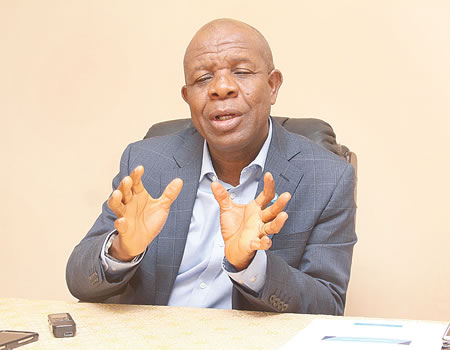OVER year down the line, how has it been managing the affairs of the institute?
I would say it was tough, challenging, but also very exciting. Of course, I don’t need to repeat where we are coming from, I think you know that. Right from the start, the council tried to do a few things to stabilise the institute, putting it in the direction it should be. It’s quite challenging, but we have achieved quite a lot also in the process.
Can we have the specifics now?
If you want me to be specific about things that had happened, I think fundamentally the number one thing that we are very proud of is that we finally got our proclamation. This was done during my investiture by the minister. You can also see that we are in a brand new office. Yes, it still needs to be furnished, but I think the environment is far much better than where we were before. It was one of the cardinal promises that we made to our members. In terms of our membership database, we are working on that. You can also see that we now have Register of our members that are financially compliant.
Earlier this year, we also had a great annual conference where we had the best of marketing professionals, in attendance. I think what excites me most is that within the past one year, our members are beginning to bring the confidence back to the institute. People who had ‘retired’ from the institute are coming back in droves and not just in terms of quantity alone, but in terms of quality of membership. So if you ask me, whether I’m happy with the journey that we have made in the past one year, I would say yes. Has it been tough and challenging? I would say yes.
Where does the proclamation leave the institute?
Where it leaves the institute is that we are now formally bound to follow the Act which established the institute. You know the Act that set up the institute is an Act of parliament, it means now that we must keep strictly to the provisions of the Act, in terms of running the institute and ensuring that marketing practitioners all over the country, become members. So we are bound now fully by the law, as enacted by the Act.
How much of the promises made, on assumption of office, have you been able to achieve?
When you are talking of developments and building a structure, it is continuous, there are certain things that we can say this and this have been done. But there are others that would always be work in progress. For instance, that we have moved into a new secretariat, it is physical, it’s something that we can see. You can even see that it is work in progress in terms of furnishing it to taste. In terms of building the equity of the NIMN brand, that obviously is work in progress.
But significantly, you can see a shift that members of the institute who had gone away from the institute are coming back because they now believe in the institute. When we were talking of getting this secretariat, one of our members, from his personal resources, because of what he sees in terms of the direction the institute is taking, gave a personal cheque of one million naira. We’ve had members who had also given various sums of money. Some had donated laptops and the rest of them. That shows the direction we are going.
People are beginning to believe in the institute again. A few things are work in progress, a few things, obviously, have been achieved. And don’t forget, we are just mid-term any way. We’ve just done slightly over a year out of our two-year term. We still have a little while to do more things.
Last year, you disclosed that the number of registered members of the institute was less than one thousand. From then till now, has that improved?
When I say active members, our definition of active is actually those who have paid their dues to date, not those who attend our meetings, or those who still parade themselves as members of the institute. But in terms of those who have paid their dues up to date, I think we are moving in the direction of two thousand, and the number is growing everyday.
You provided some window of opportunity and threatened to wield the big stick, on those practising marketing illegally, if they failed to utilise such? What has the response been like?
I wouldn’t want to use the word ‘big stick’, because they sound confrontational. For us, it is not really the way to go. What we will continue to repeat is that: for true marketing practitioners, it is in our collective interest that we come together and enjoy what marketing profession offers, in terms of interactions, in terms of opportunity for learning, in terms of peer reviews and the rest of it. Yes, we did say that as part of our efforts we are going to drive compliance but we are not talking of big stick. What we keep saying is that enforcement would be a last resort. As much as possible, we want to let our members and their companies understand the reasons the institute was established in the first place, the benefits that marketing professionals stand to gain for being a part of the institute. I think that is what we have been doing, I can assure you that a number of companies have been responding very well. We are also in consultation with NECA, the Nigerian Employers Consultative Association, discussing how we can jointly work on this.
Besides, we are also in consultation with the Advertisers’ Association of Nigeria (ADVAN). What we believe is that once people understand fully, the benefits of the institute to marketing professionals, you probably, don’t need to wield the big stick as you want to call it. So consultation is going on, contact is going on. Within the past few weeks, I’ve had to meet those two bodies in terms of trying to get this compliance.
But when will you be tired of dangling the ‘carrot’?
Once again it seems not defined the way you would want it defined. Compliance is something that continues. We are not going to get tired of talking, but the truth is that talking is not going to be endless.
I can’t tell you now that ‘oh, next week, next month, I’m going to wield the big stick’. I think part of our responsibilities also is to understand that some people went away because of what it is, and the way we are going now, going by some things that we have done in the past few months, we may not even need to wield any big stick. Just by the sheer fact of what we have been doing, some people on their own have been coming back.
On our part as an institute, we continue to provide value for our members, so that they themselves would see that there is value in being a part of the institute. At the same time, of course we would continue to discuss with them, discuss with their organisations.
I am quite confident that we may not get to that extent of using the big stick. But at the end of the day, we are talking of the laws of the federation of Nigeria here, if some still remain stubborn and say they do not want to comply, then we would be left with no option to say, ‘This is our law, and we are all bound to obey them. I know you want to push me to a specific time frame. I want to leave it a little bit open. I know a lot of things are happening and people are understanding us better.
How would you describe members’ response, especially those whose names are missing here, since you released this register in February?
Between then and now, many people have joined the institute. Many have regularised their membership, and of course, we can not be publishing this everyday in the papers, or in the register, but if you go our website as at today, you will have the most updated -list of members.
So if you paid yesterday, and you are now fully compliant, if you go to the website, your name will be there.
But how often do you intend to be publishing this register?
Every year, the Act mandates the Registrar to update the register every year.
Your campus initiative, how has it been?
Still very much on. Few weeks ago, we were in Yabatech to talk to the students. I already have a date to go to Uniben to talk to the students. Next week we are going to Laspotech, few weeks ago, we were in Ogbomosho.
What does the feedback, from the campuses say about the future of marketing practice in Nigeria?
Let me give you an example. When we went to Yabatech, one of the students asked me a very interesting question. He said they had been having this debate among themselves, those of them doing marketing, those of them reading Biology, others reading different subjects. They wanted to know which subject was the most important. The answer I gave them was simple. Yes, out of self-pride, you might beat your chest and say my own is the best, but at the end of the day, society needs the different professions. While interacting with these students, I found out that the fact that they had seen people who are marketing practitioners, and who can actually give their life example of what they have done in terms of marketing, it reinforces their choice of the marketing profession. They are even more excited about the marketing profession after we had talked to them. So it’s generally positive wherever we have gone to. I see people who are now more excited.






